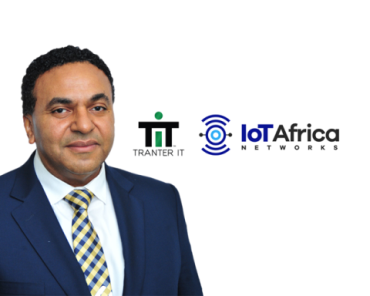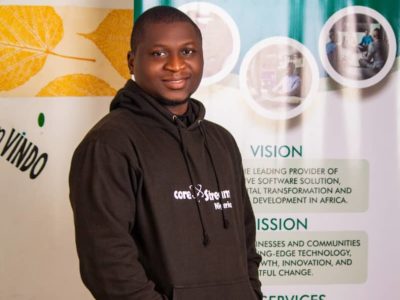Lare Ayoola, CEO and Chairman of Tranter IT, shares with Olusegun Oruame, IT Edge News the growing importance of cybersecurity for organizational sustainability and the necessity for businesses to adopt emerging technologies such as AI, cloud, and edge computing. As the newly elected president of the Information Technology Association of Nigeria (ITAN), Ayoola outlines his vision for revitalizing the association to spearhead transformational changes across all sectors where IT is pivotal.
As a provider of infrastructures support for commercial banks and companies across the various industries what are the key challenges your clients face?
In Nigeria today, we face quite a number of challenges some of which people in other parts of the world don’t face. However, if we address it from a core IT and not an environmental perspective. I would say that cybersecurity threats are one of the most critical or most worrying challenges that our clients face. If our clients face threats, it means we also face the threats because it’s our responsibility to resolve those threats or prepare those clients against those threats and ensure that the clients are safe. With increasing sophistication of cyber threats, protecting our clients’ IT infrastructure from cyber-attacks, data breaches, ransomware, and other malicious activities is a top priority for Tranter IT. Staying ahead of evolving threats requires constant vigilance, and investments in robust security measures. So in an environment of limited cash, if you like, limited investment capital, you can imagine that achieving what I’ve just said, is not always easy for the clients.
RELATED: How Tranter IT’s technical team keeps your business up and running
The second challenge is the legacy systems integration. A lot of clients are using like the C systems, that is systems that have been in existence for quite a number of years and they are not easily compatible with modern IT infrastructure solutions. So integrating these systems with newer technologies while ensuring smooth operations and minimal disruptions can be complex and time consuming. But fortunately, one of the attributes that Tranter IT has, is being able to retain manpower. So we have a season’s crop of engineers that are able to address these types of issues and integrate legacy systems with modern technologies like ManageEngine. As you know, a ManageEngine is an IT automation and operations as B2B applications that facilitate the easy operation of complex IT infrastructure, making it a lot more efficient to operate.
Some of the emerging trends that are likely to shape the future of IT infrastructure services is cloud adoption and now Edge Computing
The third item I’ll talk about in terms of challenges is scalability and flexibility. Businesses today require IT infrastructure that can scale up or down rapidly to accommodate changing needs and growth. Now, we need to ensure that our infrastructure solutions are flexible and scalable, or sufficiently so to meet evolving business requirements. This is a crucial challenge that we have. Nobody wants to invest in software, and then when they grow, they have to discard that software or be forced to buy brand new software. So if the software that is installed from day one is scalable and flexible, it reduces the cost down the road. This is why you know, CIOs and heads of IT ensure scalability and flexibility as some of the characteristics of any software application that they are buying today.
The fourth is downtime and reliability. This has always been a challenge, and we to minimize downtime and ensure high availability of IT services which is obviously paramount for our clients. Any disruptions or outages can have significant financial and reputational consequences. Implementing robust disaster recovery and redundancy measures is essential to mitigate these risks. So, you know, we have been a company that has been leading in the IT support arena, both the back office and the front office, the clients end, and we have developed what I would call an advanced specialization in ensuring that support so that downtime is minimized. That has been one of the key businesses or focused service offerings that we have provided to the world, well to Nigeria in this case.
Japa syndrome – Skill shortage is a major challenge
The next challenge is the skill shortage. As we know, there’s something called Japa where we have a lot of our brains, a lot of our intelligent, skilled, experienced personnel, professionals, leaving the country to other countries. Skill shortage is a major challenge. Shortage of skilled IT professionals in certain areas poses a challenge in delivering high quality infrastructure services. Recruiting and retaining talents with the necessary expertise in areas such as cloud computing, cybersecurity, and emerging technologies can be competitive and resource intensive. We have not been left out from that Japa syndrome. But because we are very proactive and reactive, you can’t be 100% proactive because you can’t foresee everything. But you can try your best to be proactive, to pay attention to the needs of your staff. We pay attention to market trends, to what makes people want to stay and what makes people want to join us and focus on those things to ensure that we are always equipped with the right quality and the right skills in-house to deliver services to clients, which is why our service levels in our clients sites are above 99%. I know that sounds almost untrue, but we’ve been in business for a long time. Tranter IT is now 20 years old this July. We have perfected the art of recruiting properly, training appropriately, retraining and embarking on policies of continuous training and continuous assessment to ensure that the skill levels of our people is top notch at all times. We are able to exceed the expectations of our clients and this is indeed, an art taking HR and manpower development seriously is certainly a key component of success. It is a key pillar of success in industry today, whether you are an IT services organization or a bank, or a manufacturing outfit, if you don’t focus on your manpower, on your technical manpower, you might find yourself unable to meet your targets.
ITAN has a lot of work to do to resolve big problems, for example, the issue of certification in the IT industry.
Keeping pace with rapid technological advancements and adopting new innovations
The next item is technological advances. I would say keeping pace with rapid technological advancements, and adopting new innovations such as cloud computing, Internet of Things (IoT), AI and automation. Compatibility with existing systems requires strategic planning and investments. So many organizations are falling short of their technological advancements simply because they are looking at cloud computing separately, IoT separately, AI separately, and automation separately. They are not looking at an integrated strategy for making the organization digitally compliance, and digitally proficient. You cannot talk about cloud computing, if you also don’t cater or consider IoT. The Internet of Things collects data from the clients or ecosystem and brings that data into the center, which is analyzed; when it is analyzed, it has to go somewhere, or to someone. Then the question is whether you have the data analytical capabilities of processing the huge amount of data that the Internet of Things solutions are going to bring to you? Do you have an objective in knowing precisely why you’re collecting the data and how it will benefit the organization because collecting data is certainly not the end of the story? Utilizing that data to improve the bottom line of the organization to increase efficiency, productivity and to improve staff’ job satisfaction to make working exciting and not boring – all these things have to come into play. So an integrated approach is what we would recommend.
In the rapidly evolving landscape, what emerging trends do you foresee will shape the future of IT infrastructure services across industries?
Emerging trends are certainly important to organizations, for the clients to see what solutions are available and can now be applied to improving the performance overall. It is also to mitigate risks and to achieve, you have to be abreast of the most recent technologies or emerging trends usually driven by what others who are on the cutting edge have tried and found to be successful. Then by word of mouth or by sharing case studies, other companies now jump on the bandwagon so to speak. Some of the emerging trends that are likely to shape the future of IT infrastructure services is cloud adoption and now Edge Computing. Many organisations have moved from on premise data centers on premise data storage and data processing to cloud based solutions. So businesses will increasingly move towards cloud based IT infrastructure for its scalability.
ITAN will adopt advocacy to facilitate the developments of the IT industry and to facilitate the success of Nigeria as a digitally compliant and digitally advanced society.
Cloud adoption also allows companies like IoT Africa Networks, which is a subsidiary of Tranter IT, to offer flexible and on demand services tailored to specific industry needs. So basically IoT Africa is involved in collecting the data from the fields, from the factories, from the mines, from the farms, from the oil and gas fields, from your offices and from your restaurants and your supermarkets, fridges and freezers and coolers and children’s schools. It not only allows you to collect data and manage your ecosystem, it also provides data analytics services, which allows you to analyze that data and convert the raw useful information that will now be utilized and used in developing useful reports that are tailored to the needs of each of the managers within an organization, the HR manager is interested in something quite different from the IT manager and the CIO needs the information that’s different from the head of IT. So all that data analytics, processing the data into useful information in the form of concise and to the point reports is what IoT Africa can deliver.
Edge computing is something that’s becoming very important because it brings a processing and analytics of the data closer to its source or the sensors and devices. So processing and analyzing data closer to its source will be crucial for applications and real analytics in manufacturing, oil and gas, logistics and other sectors. IoT Africa can provide Edge computing solutions to complement cloud infrastructure for industries heavily reliant on real-time data.
Cybersecurity is an emerging trend and increasingly important because as we know, many banks in Nigeria and many organisations have suffered cyber-attacks so reliance on interconnected devices raises security concerns. That is one of the reasons why the Internet of Things has not moved as quickly as it should have moved because people are worried about these interconnected devices being the gateway for cyber-attacks. With a solution like Sigfox 0G Technology, that challenge can be effectively addresses and this is why IoT Network Africa is the Sigfox 0G Technology partner for Nigeria. The Sigfox 0G Technology doesn’t allow cyber-attacks. It is virtually immune to that because of the way that the technology is structured so it is not possible for someone to utilize the Sigfox network to penetrate a client’s IT infrastructure.
Lastly, we have IoT and 5GNetwork rollout. The rollout of 5G promises faster speeds and lower latency, enabling new applications like remote monitoring and control. IoT Africa Networks can adopt its services to leverage the potential of IoT and 5G for improved performance and efficiency across industries.
As President of ITAN how do you plan to set the agenda and lead ICT advocacy efforts to reposition ITAN as a prominent force in promoting technology adoption?
Just recently, the elections of the Information Technology Association of Nigeria (ITAN) was conducted and I was elected as the president of ITAN and this happened just two or three months ago. I and the executive committee along with the board of directors of ITAN have been working hard to redesign ITAN, to look at the primary objectives of ITAN and maximizing the positive impact that we have on Nigeria or Nigerian industry, and more specifically on the IT industry, because if the IT industry is healthy then Nigeria is healthy. ITAN stands to play a very important role in the development of the IT industry and the IT industry is critical to the development of Nigeria. Without the IT industry, which basically nurtures the digital economy, we will certainly not develop as a nation as fast as we should. We would not remain competitive in the international arena. So, ITAN, the acronym for the Information Technology Association of Nigeria is really a very important Association. And since I was elected the president, myself and my executive, and the board of directors of ITAN have been working tirelessly to. We have been working to make sure that we come up with the right type of strategies and programme. ITAN will adopt advocacy to facilitate the developments of the IT industry and to facilitate the success of Nigeria as a digitally compliant and digitally advanced society.
Cybersecurity is an emerging trend and increasingly important because as we know, many banks in Nigeria and many organisations have suffered cyber-attacks so reliance on interconnected devices raises security concerns.
ITAN has a lot of work to do to resolve big problems, for example, the issue of certification in the IT industry. In Nigeria today, we have different organisations, whether Cisco, HP, Microsoft, ManageEngine, Zoho, Oracle, SAP and so on. All these organisations have certifications that they offer. Now, these organizations are selling their software in Nigeria and in order for the software to run well, to be managed properly, to be supported efficiently, they need to have certified personnel. The reason for certification is basically an attestation that this individual or group of individuals are qualified to work to support this platforms, the software applications, and many a time in order to gain employments in organizations, you need to show that you are certified. I would also add that in Nigeria today, most people are earning naira. But you have a situation where the foreign organisations are charging Nigerians in US dollars. Not only that, they’re asking Nigerians to pay the US dollars to foreign bank accounts. Obviously, you know what that means. The payment is not taxable, the Nigerian government is losing a lot of tax revenue from that alone. Now, how many Nigerians have foreign bank accounts? How many Nigerians would find it easy to make payments to foreign websites in dollars? We will be talking to all foreign organisations that are doing business in Nigeria and we will be asking them to stop charging in dollars, to take into consideration the earning power of Nigerians in charging for certification. I did an analysis once recently and I found out that for one particular certification, a Nigerian engineer would have to use three full months salary to pay for that certification. That’s not including the training. That’s the certification; 100% of the salary for three solid month just to pay for the certification. His counterparts in the United States would use maybe about 5% to 10% of his monthly salary to pay for that same certification. Obviously, this is a deterrent to Nigerian engineers to become certified. It has been made unaffordable for them. Even when the engineers have saved up their money, and they’re determined to get that certification, because they need to move their career forward, to actually make the payments is a Herculean task. Why is it that these organizations, profiting and enjoying the Nigerian economy and selling their software into Nigeria, are making it difficult for Nigerians to learn about their software? Why are they making it very difficult for Nigerians to afford and pay for the certification? Is it because they want to bring in foreign engineers to do the job because obviously, they will say, if you are not certified, you cannot work on our software. When we approach all these foreign organizations that are selling software and hardware into Nigeria, we will be seeking their response as to whether they have a negative agenda towards Nigerian IT engineers.

































